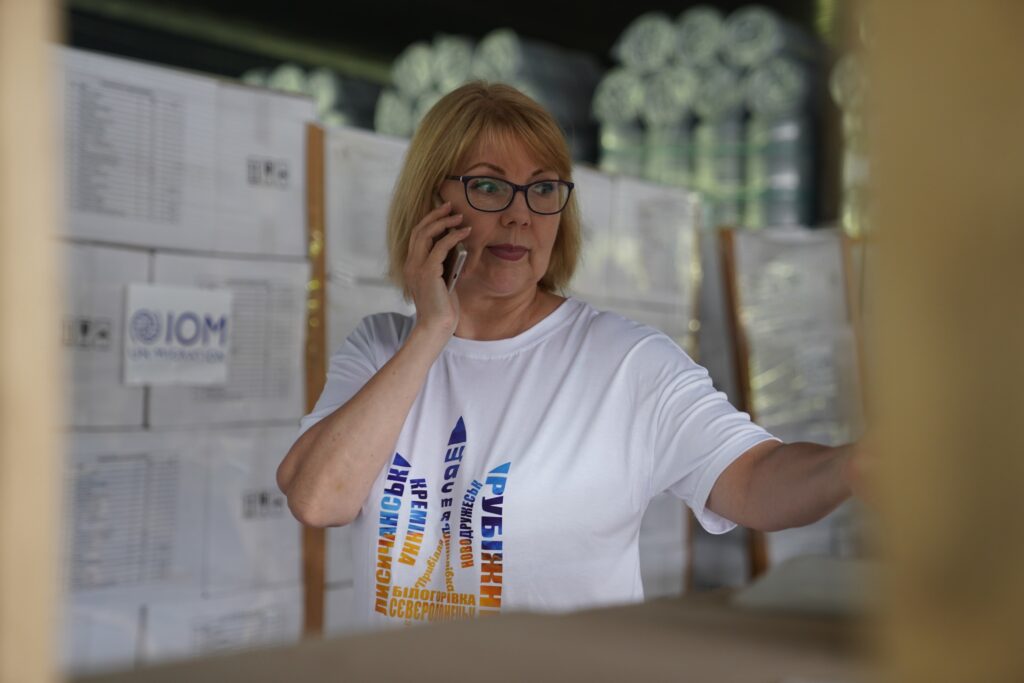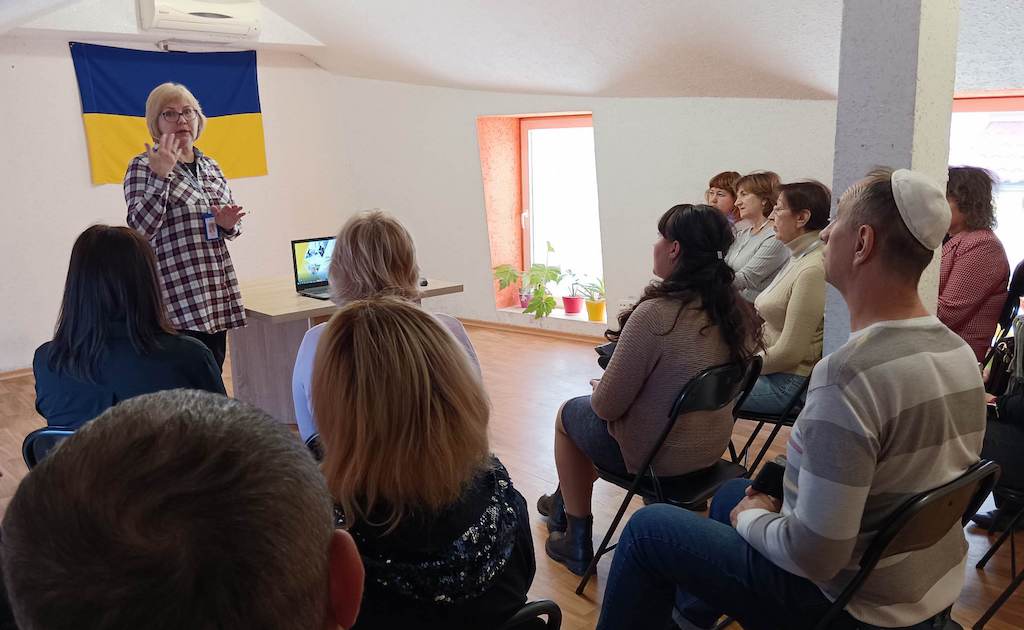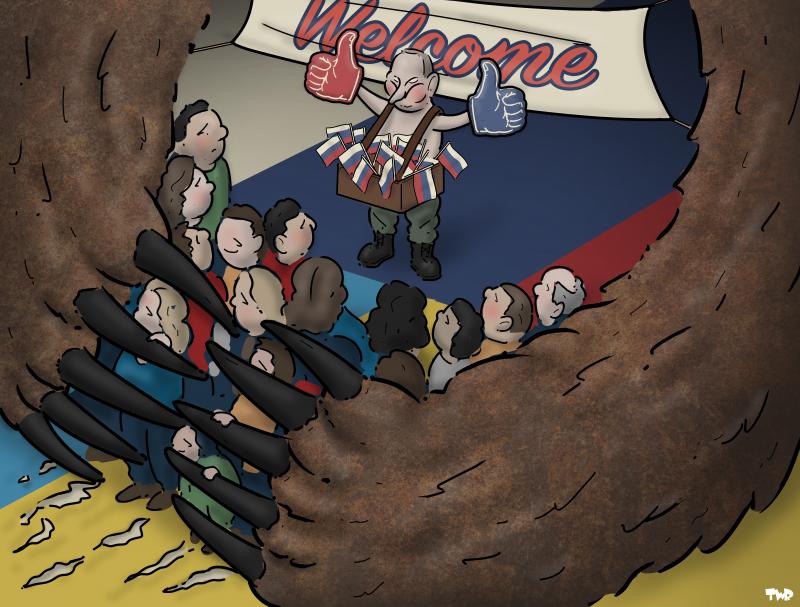Since the beginning of Russia’s full-scale invasion of Ukraine, the Luhansk-based Благодійний Фонд Реалізації ідей ("Charitable Foundation Realisation of Ideas") has been working in Dnipro alongside other NGOs and government agencies to help refugees from the occupied Donbas.
“Realisation of Ideas” was launched in 2018 in the cities of Severodonetsk and Lysychansk (Luhansk region). At that time, its aim was to promote entrepreneurship and self-employment in eastern Ukraine. For almost all this time, it has been led and inspired by its director Olena Agafonova. Following the full-scale Russian invasion, the organisation has pivoted towards humanitarian work.
Two weeks after 24 February: time for reflection
On 24 February 2022, she, like many others, woke up to the terrible news of the Russian invasion.
Olena recalls: "On that day, I woke up at half past five in the morning to a call from my son in Kyiv. He said there was a war and that I should come to him. But I stayed in Severodonetsk for two whole weeks."
At first, she had no thoughts of leaving the city. She was not afraid of shelling, food shortages and other hardships. Even while sitting in the basement listening to the explosions, she would use her internet channels and Telegram to continue helping the people of Severodonetsk, by providing information on humanitarian aid and by organising the evacuation of people from the city to safe areas.
According to Olena: "More than eight hundred people received our help at that time. We used donations to buy medicines and food and delivered them to Severodonetsk and Lysychansk via volunteers."
“The shelling went on and on, and it became clear that I needed to leave the city and be more useful to my fellow countrymen,” she recalls. “We found friends who helped us to leave for the city of Dnipro. From the very first days, there were a lot of IDPs [internally displaced persons] from Luhansk region in Dnipro and they were constantly arriving. It was hard, but we had no time to think about our own problems. We had to get to work as volunteers. And so the organisation began operating from the very first days after the move.”
!function(){"use strict";window.addEventListener("message",(function(a){if(void 0!==a.data["datawrapper-height"]){var e=document.querySelectorAll("iframe");for(var t in a.data["datawrapper-height"])for(var r=0;r<e.length;r++)if(e[r].contentWindow===a.source){var i=a.data["datawrapper-height"][t]+"px";e[r].style.height=i}}}))}();The three necessary components for a social cause
Olena Agafonova and I got to know each other a few years before the full-scale invasion. We met at several international trainings and webinars for public figures. On each occasion she inspired others with her optimism, calmness and ability to get people interested and to organise useful work for the benefit of the community.
I remember once walking to the hotel after a day of training in the city of Severodonetsk. We were talking about the creation of a regional union of NGOs, about the opportunities that would open up for all participants individually and together. Olena spoke with enthusiasm and genuine interest about promising future projects and the opportunity to do good for the city and the region. Then I asked her a question about how she manages to find the time and energy for this charity work. What does it take?
"I don't know where exactly I get my strength from. This is my life's mission, and that's why the Lord gives me strength," she answered. In her eyes, things are simple. You need to be sincere with yourself and other people; understand why and for whom you are working; and, most importantly, do everything only at the call of your heart.
The beginning: sending humanitarian parcels
On 8 March 2022, Olena Agafonova arrived in the city of Dnipro. On 11 March, her charity started sending aid parcels to the refugees. She decided that there was no point in sitting around watching the news on Telegram and crying about it. She would rather work for victory. Soon her organisation was being contacted by IDPs from the active war zones of Luhansk, Donetsk and Kharkiv regions. It worked hand in hand with the refugee centres, hospitals and army, from morning to late at night.
The experience gained earlier – in entrepreneurship consultancy – is now serving humanitarian aid. Between 2018 and 2022, Realisation of Ideas conducted 500 hours of training and hundreds of hours of individual consultations. It partnered with international organisations including the United Nations, the European Union, the German government, the International Organisation for Migration (IOM), and others.

The charity's employees, who previously trained people to raise funds for business development, have now taken on the task of organising and providing humanitarian aid to war refugees. Olena elaborates: "From June to the end of 2022, our charity foundation and the IOM worked together to distribute humanitarian aid worth about $410,000 to 13,000 people." The aid included food, hygiene products, utensils, medicines, bedding and clothing.
Recently, with the support of IOM, the foundation has provided assistance to 5,800 families in war-ravaged villages in the Kharkiv region, in the form of stoves and heaters.
Meanwhile, with help from the Eastern Europe Foundation, 304 refugee families in the Dnipropetrovs'k region have received shelter kits, blankets, towels, jerry cans and bags.
Today [early December], humanitarian aid is being distributed to residents of war zones in Dnipropetrovs'k, Zaporizhzhya, Kharkiv and Donetsk regions. It is planned that 14,395 families will receive assistance in the form of stoves, heaters, coal and firewood.
In most cases, it is thanks to such joint projects that the organisation is able to raise funds. As Olena Nekhayeva, an employee, says: "We are constantly writing new project proposals. Not all are approved, but we do not stop."
A volunteer centre opens
In June last year, the organisation opened a volunteer centre called Луганщина - це Україна – "Luhansk Region is Ukraine". It was supported by the United Nations Development Programme and Luhansk region’s Association of Civil Society Organisations. The centre cooperates with the police and conducts safety training for refugee children. It also helps small business owners from Luhansk and Donetsk to seek new funding to restart their businesses, and assists others who lost their jobs.
Project-management training is particularly popular with such people. Psychological counselling is also increasingly in demand, in addition to material assistance. People who have lost their homes, relatives, friends, jobs and everyday routines are often not in the most positive state of mind.

Volunteers help not only IDPs but also, whenever possible, members of the armed forces. "Usually, we help individual soldiers or brigades that we know or that the volunteers find," says the manager.
As for those volunteers, new ones are constantly joining the movement. There are refugees among them, but regular assistants are the real backbone of the movement. For example, Yevhenia Zhukova from Severodonetsk started volunteering almost as soon as she left the occupied city for Dnipro in 2022. Being an internally displaced person herself, she knows how difficult it is to settle in a new place. Yevhenia explains: "So many people have lost their homes and jobs because of the occupation. I am no exception. We need to help each other."
Initially, about ten participants were involved, ready to help at any time. A year later, there are already about a hundred people. There are foreigners among them. One is Oldag, a volunteer from Germany who came to Dnipro in the summer. He helped financially and has also promised to help with transport for the organisation.
Now the charity is making plans for the future. It aims to organise counselling sessions for refugees and volunteers. It also plans to launch a website in order to disseminate information about its services and help raise funds both for the IDPs and the Ukrainian military. "For now, we mostly post information about our activities on our Facebook page," says Olena Agafonova.
Over the past year, more than 13,000 residents of Luhansk, Donetsk and Kharkiv regions have received support from Realisation of Ideas. The work is ongoing.
Plans and challenges
The deeds of this charity speak for themselves. And more and more people are turning to it for help. Yet it is becoming increasingly difficult to operate. Olena Agafonova explains: "As manager, I need to take care of paying for office rent, staff salaries, and so on. It is our enthusiasm that allows us to survive." She says that she invests everything she earns in the organisation. Raising donations is becoming difficult. Finding stable funding and large donors is almost impossible. She faces a lot of obstacles which can be overcome only by hard work and sheer determination.
About the future of Ukraine, Olena says: "I believe in our people and in the armed forces. The country will be free, independent, with the rule of law, where people come first. Believe in yourself, believe in Ukraine." She adds that after the victory there will be a lot of work to be done, and that she and her organisation will be involved in it. This alone is a great motivation for the future.
This article is published in partnership with the Voices of Ukraine project by the European Centre for Press and Media Freedom.
Do you like our work?
Help multilingual European journalism to thrive, without ads or paywalls. Your one-off or regular support will keep our newsroom independent. Thank you!
















